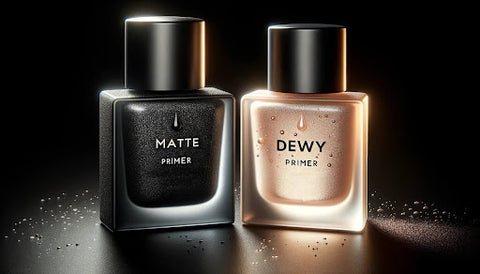
How to Pick the Perfect Primer for Acne-Prone Skin: Matte or Dewy?
The Battle of the Finishes: Matte or Dewy?
When it comes to primers for acne prone skin, the choice between a matte or dewy finish can make a world of difference. Let's dive into the world of primers and find out which finish suits your skin best!
Understanding Acne Prone Skin
Before we jump into the primer showdown, let's understand acne prone skin. It's like a rollercoaster ride - unpredictable and bumpy acne prone skin requires extra care and attention to keep breakouts at bay.
The Matte Marvel
- Pros: Absorbs excess oil, helps control shine and gives a smooth, velvety finish
- Cons: Can be drying, may emphasize dry patches
The Dewy Delight
- Pros: Adds a healthy glow, hydrates the skin, creates a luminous finish
- Cons: Can make oily skin look greasy, may not be ideal for those with active breakouts
Choosing the Right Primer
- Skin Type Matters: For oily skin, opt for a matte finish to control shine. While for dry skin, we recommend you instead go for a dewy finish to add hydration.
- Ingredients Check: Look for primers with salicylic acid or niacinamide to combat acne.
- Trial and Error: Don't be afraid to experiment with different primers to find your perfect match.

Our Top Primer Option for Acne Prone Skin!
Type Beauty Matte Up Balancing Primer
The Type Beauty Matte Up Balancing Primer is a must-have for acne prone skin. It's a lightweight, oil-free formula that smoothens and brightens the skin while preventing acne, dullness, and dryness. It contains niacinamide and zinc to help balance oil production and prevent breakouts
Tips for Applying Makeup for Acne Prone Skin
- Make primer your BFF
- Use a primer that is non-comedogenic and won't clog pores
- Apply primer evenly on your face and neck
- Use a colour corrector to conceal redness and scars
- Steer clear of oil-based, heavy foundation
- Choose a foundation that is lightweight and oil-free
- Apply foundation with a brush or a beauty blender
- Blend well to ensure a smooth finish
- Always use clean makeup brushes and sponges
- Clean your makeup brushes and sponges after every use
- Use a gentle cleanser and warm water to clean your brushes
- Avoid sharing makeup brushes or sponges with others
- Use a colour corrector
- Apply a green colour corrector to conceal redness and scars
- Use a yellow colour corrector to brighten up dull skin
- Use a purple colour corrector to neutralize redness
- Always remove your makeup at the end of the day
- Use a gentle cleanser to remove makeup
- Apply a toner to balance your skin pH
- Moisturize your skin to keep it hydrated and healthy
Conclusion
Embrace Your Skin, Prime with Confidence
In the world of matte vs. dewy, finding the right primer for acne prone skin is like finding the perfect avocado - tricky but rewarding.
Keep exploring, experimenting, and embracing your unique skin journey.Acne prone skin deserves love and care. By choosing the right primer and a consistent skincare routine, you can achieve a flawless complexion.
Embrace your skin, prime with confidence, and let your natural beauty shine through.Dealing with acne can be tough, but remember, you are more than your skin. Your worth is not defined by your imperfections. Keep your chin up, keep shining, and keep slaying.
You've got this!
Matte vs. Dewy Primer for Acne-Prone Skin: FAQs and Tips
- Can I wear makeup if my skin is acne-prone?
Yes, you can wear makeup if your skin is acne-prone. Just make sure to choose products that are non-comedogenic and won't clog pores.
- Is primer effective against acne?
Yes, primer can be effective against acne. Look for primers that contain salicylic acid or niacinamide to help combat acne.
- Which is better for acne, powder or liquid makeup?
Powder makeup is ideal for acne-prone skin over liquid makeup. Powder makeup products have larger pigment particles and hence are less likely to clog pores.

Comments (0)
There are no comments for this article. Be the first one to leave a message!